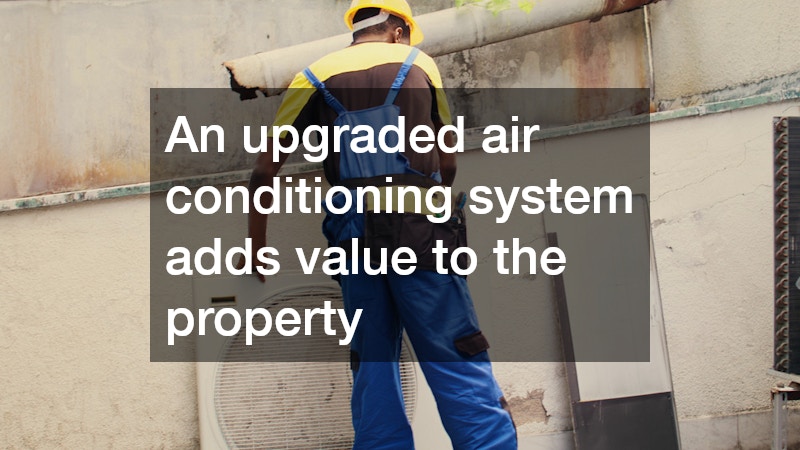
Maintaining a comfortable, efficient workspace is a top priority for many businesses. Whether you run an office, retail space or hospitality venue, the performance of your building’s air conditioning system directly affects the experience of your staff, clients and customers. Upgrading to a modern system is often overlooked until problems arise, but doing so proactively can deliver long-term value, cost savings and operational improvements. This article explores the top benefits of upgrading your commercial air conditioning system, helping business owners make informed decisions that align with both short-term goals and future-proofing strategies.
An old or underperforming system may be costing more than just higher electricity bills. It can influence staff productivity, increase the likelihood of breakdowns and make it harder to meet environmental regulations.
Whether your focus is on improving energy efficiency or future scalability, upgrading the system presents clear advantages worth considering.
Increased Energy Efficiency & Cost Savings
Energy efficiency is one of the most significant benefits of upgrading your system. Newer units are designed with improved technology that consumes less electricity while delivering better output. This translates to lower monthly power bills and reduced pressure on energy infrastructure within the building. In the long run, the initial investment in a modern system is often offset by the decrease in ongoing operational costs.
Businesses aiming to reduce their carbon footprint also benefit from improved efficiency. A new system is more likely to meet or exceed energy rating requirements, which not only supports sustainability goals but can also lead to eligibility for certain rebates or certification incentives.
Additionally, smart energy management tools that accompany newer systems provide greater control. These allow business owners to monitor usage patterns, identify inefficiencies and adjust settings in real time to ensure optimal performance.
Enhanced Indoor Comfort & Air Quality
Comfort plays a major role in how people perform and feel in the workplace. An outdated or poorly maintained system may fail to regulate temperature evenly, leading to hotspots or cold zones throughout the premises. This discomfort can reduce morale, impact customer satisfaction and even contribute to staff absenteeism in more extreme cases.
Upgraded commercial air conditioning systems come equipped with better air filtration and humidity control features. These enhancements help reduce the circulation of allergens, dust particles and airborne bacteria. The result is a cleaner, healthier indoor environment that supports employee wellbeing and customer comfort.
Consistent airflow and temperature regulation also ensures that sensitive equipment or materials are stored in conditions that prevent damage or degradation, which is particularly important in industries like IT, manufacturing or healthcare.
Lower Maintenance Requirements & Fewer Breakdowns
A major source of frustration for businesses is the recurring need to repair older systems. As air conditioning units age, their components wear out, leading to more frequent service calls and extended downtime. This can disrupt daily operations, especially in environments where climate control is essential to workflow.
By upgrading to a modern system, you benefit from the reliability of updated components and current design standards. Many newer systems are built with diagnostics that provide early warning signs of malfunction, allowing issues to be addressed before they escalate. This not only prevents unscheduled outages but also helps prolong the life of the equipment.
Furthermore, maintenance routines tend to be less intensive for newer systems. With fewer moving parts, improved engineering and built-in self-monitoring, your team or service provider can maintain functionality without excessive disruption or cost.
Improved Building Compliance & Future Scalability
Australian building codes and environmental standards are constantly evolving. A commercial air conditioning system installed ten or fifteen years ago may no longer meet today’s expectations for efficiency, emissions or refrigerant types. Upgrading now ensures compliance with current legislation and minimises the risk of penalties in the future.
Beyond compliance, a new system provides greater flexibility for future expansion or changes to building usage. Whether you plan to increase your floor space, sublease sections of the property or upgrade to a smart building system, having a modern air conditioning system in place makes integration easier.
Scalable systems allow additional units or zones to be added without requiring a complete overhaul. This is particularly useful for growing businesses that expect to evolve their layout or operations in the coming years.
Increased Property Value & Tenant Appeal
An upgraded air conditioning system adds value to the property, whether you own the building or lease it to others. From a resale perspective, buyers are more inclined to invest in properties with energy-efficient infrastructure already installed. For landlords, offering a reliable, high-performing system can be a deciding factor for securing long-term tenants.
Commercial tenants are becoming more selective, with many expecting features like zoning controls, digital thermostats and low-maintenance systems as standard. By meeting or exceeding these expectations, you position the property as a desirable space that reflects modern business standards.
Even if selling or leasing isn’t immediately on the horizon, maintaining infrastructure like air conditioning pays off by preserving the overall condition and appeal of the space.





